MUSINGS ON AWARENESS – 02
This series is based on the Awareness Course that is incorporated at the post-graduate level programs of the Sri Sathya Sai University. Its author is the Sri Sathya Sai University’s former Vice-Chancellor Professor G. Venkataraman who has been closely connected with the formulation, content and delivery of this program for more than a decade now. The series was first broadcast over Radio Sai in response to requests from many listeners seeking clarifications on many spiritual dilemmas faced in daily life. Therefore, it was presented in a simple format suited for anyone who wishes to live life in a state of Awareness as prescribed by the Supreme Teacher Bhagavan Sri Sathya Sai Baba.
In the present article, one of these radio talks has been adapted appropriately and supplemented with apt illustrations for ease of understanding.
By Prof. G. Venkataraman
Awareness means since every human being is a spark of God, people must live their lives deeply conscious of the fact that they are divine at the core. We must ensure that all our actions are guided by the truth that God is present at all times, in all beings and in all inanimate entities too.
Dichotomy of Reality
Forgetting this reality, man violates the Golden Rule. He first factorises creation in respect to God and Society, and then adopts convenient standards of behaviour for dealing with God on the one hand, that is if he believes in God, and dealing with his fellow human beings and Nature on the other.
This fragmented approach makes it possible for human beings to easily adopt double standards. We freely express love to God but when it comes to dealing with our fellow human beings, we sometimes behave in an abominable manner, totally oblivious to the presence of the same divinity in the other person. In short, this convenient fragmentation, gives one a split personality. If one ignores the immanence of God in fellow human beings and indeed in all living creatures, then it opens the possibility for cheating, treachery, injustice, etc., all of which are responsible for many of the problems faced by humanity today.
This discussion now progresses to another related concept – the so-called limb hierarchy. If we examine carefully, the purported Golden Triangle and the limb hierarchy are closely related. Actually, Swami Himself drew attention to it a few years ago, and there was a period when He stressed it constantly, both in private and in His public discourses.
Limb Hierarchy
The limb hierarchy goes like this: Man is a limb of Society; next, Society is a limb of Nature; and finally, Nature itself is a limb of God.
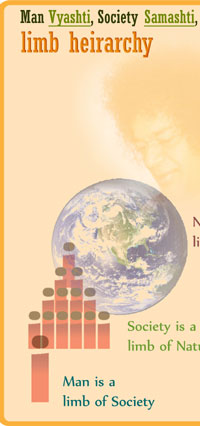 |
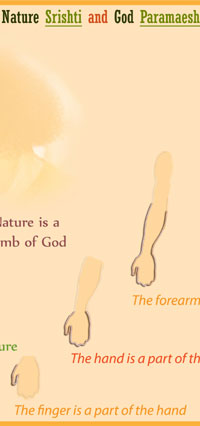 |
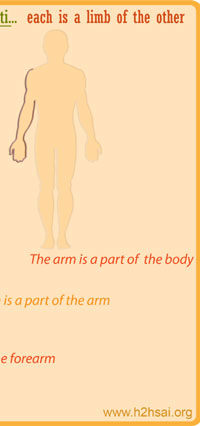 |
To start with, we have four entities - the individual, Society, Nature and God. Swami uses the terms Vyashti for individual, Samashti for Society, Srishti for creation or Nature and Parameshti for God. So we have, Vyashti, Samashti, Srishti and finally, Paramaeshti, each being a limb of the other. To appreciate the concept, we may consider a simple analogy.
Let us start with a finger. The finger is a part of the hand. The hand in turn is a part of the forearm. The forearm does not stand by itself because it is a part of the full arm, which is a part of the body as a whole. So we have here a practical example of a hierarchy in relation to the body of man. Now what is Swami’s point in mentioning this particular analogy?
Can you ever envisage a situation where the hand would deliberately injure or harm the arm and the body? No sane person would take a knife in his hand and try to injure himself, would he? In the same way, every human who is true to his or her nature cannot harm Society and Nature.
It would be a major contradiction if we pray to God and cheat fellow beings, as it would then amount to forgetting that God is present in fellow beings. |
Two important sets of words have been used here; first there is the phrase: a person who is true to his nature; then there is the word harm. Let us deal briefly with who is a person true to her or his nature.
Who Am I?
In a recent book, Nobel Prize winning Professor Amartya Sen wrote that each of us has multiple identities. Sen says he is a Bengali, an Indian, a Professor, an economist, an academic … all at the same time. He thus has multiple identities and could not be straight-jacketed into one category alone. Sen was airing this view to challenge the theory of conflict of civilizations now being intensely discussed in some intellectual quarters in the West.
The basic idea is that the current so-called war on terror is really a conflict between Western Christian civilization and Islamic ideology, which, according to the proponents of this theory, was essentially fundamentalist. Sen said that it was too simplistic to say one was a Christian and the other was Muslim and the two have to be opposed to each other. On the other hand, says Sen, each person is the sum of many personalities, with the different components being evident at different times.
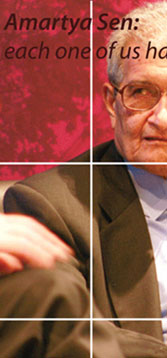 |
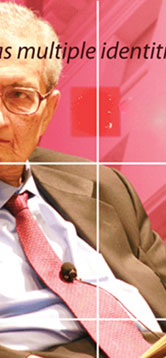 |
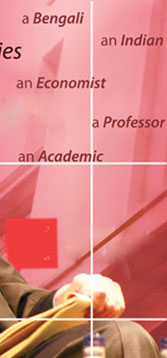 |
Professor Sen’s hypothesis has been hotly contested and falls outside the purview of this discussion. Suffice to say that from our point of view, each one of us does have different identities; and there is one particular identity that Sen ignores but we shall not and cannot; and that is the divine component of our total being. At the bodily level, we are the son or daughter of so and so.
We have to accept this as a fact of life. Try applying for a passport declaring God as your father, instead of giving the name of the biological father! Next, there is the emotional personality or identity a person has by virtue of his or her behavioural characteristics. Here, parentage and such family details recede to the background; instead, the person is described by various terms such as kind, compassionate, helpful, cruel, mean, stingy, miserly … as appropriate.
God I Am
Now there is one more identity that all of us have but few recognise, and that is our divine identity. At the spiritual level, this is the identity that really matters. And it is to remind us of this very important identity of ours that Swami always begins His divine discourses with the words, Divyatmaswaroopalara or Premaswaroopalara, meaning respectively, embodiments of the divine spirit or Atma and embodiments of love aimed at conveying emphatically the importance of being aware of our true identity which is pure divinity.
 |
 |
 |
Moral Binding versus Legal Compulsion
An individual is bound to relate to Society differently a) when the individual does not feel there is divinity latent within, and b) when the individual feels that there is God within her or him. There would be an enormous difference between the two approaches.
Some years ago, there was a famous case of a stockbroker in India named Harshad Mehta, who employed ingenious shortcuts to amass huge wealth. The scam was discovered and the person concerned was duly arrested. When charges were framed, Harshad Mehta pointed out that he had violated no law; unfortunately, what he claimed was true. What Harshad Mehta had done was to carefully examine the complex rules of financial and banking transactions, and identify loopholes; sure enough, there were plenty.
He then devised a scheme whereby he could systematically exploit the loopholes to make all the money he wanted. Was Harshad Mehta guilty according to the law? Probably not, at least that is what I recall many legal pundits saying at that time. In any case, he died before there could be a trial. Was Harshad Mehta morally guilty? No question about that.
Social Dishonesty Violates Sanctity of the Self
Life is not just about man-made laws; rather, it is about adherence to morality under all circumstances. The case of Harshad Mehta illustrates that people often think in terms of action purely along legal lines. Such people do not bother to recognise that God is very much in Society.
That is why they do not bat an eyelid while swindling Society. When one realises that God is within us and also in all of us, then one has to accept that God is very much in Society also. If God is immanent in Society, how can one say one loves God and at the same time cheat Him by cheating Society? No one who realises that Society is an embodiment of God would dare to hoodwink Society.
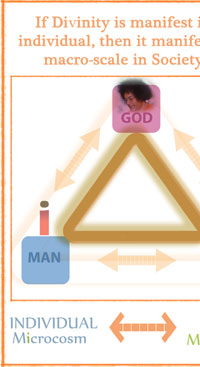 |
 |
 |
Society is nothing strange or apart from us. It is just an entity that represents all of us put together. If each one of us were good, then Society, which is the collection of all of us, would also be manifestly good. If, however, we were divine only in a latent sense, then the divinity of Society would also be dormant. This relationship between the characteristics of the individual and the Society must be carefully understood. This sequence of thought follows that:
- The individual is the microcosm while Society is the macrocosm.
- Since divinity is latent in the individual, divinity is also latent in Society, in fact on a macro scale.
- If the individual does not allow his or her divinity to manifest, then there is a slim chance of a macro manifestation of divinity in Society.
This brings us to the question: “What precisely do we mean by a macro manifestation of divinity in Society?”
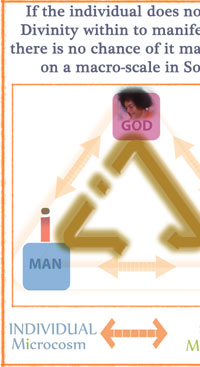 |
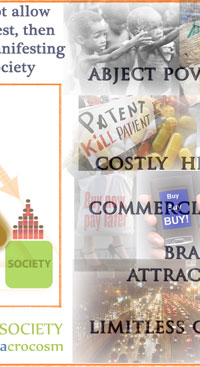 |
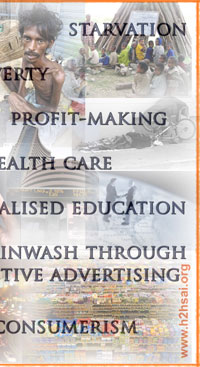 |
Social Priorities
In a Society where divinity is manifest, it would care for its citizens, especially the poor and the helpless. What are the poor desperate for? Food, shelter, clothing in the first instance, and then health care, education and old-age security.
Today, as we look around, there is hardly any Society that is bothered about these. For example, where energy security is concerned, much has been said about the oil problem, all aspects of it in fact, ranging from the political to the environmental. If one goes to the root of the oil problem, one would find it has much to do with oil addiction, especially by the advanced countries.
In brief, the oil story is as follows:
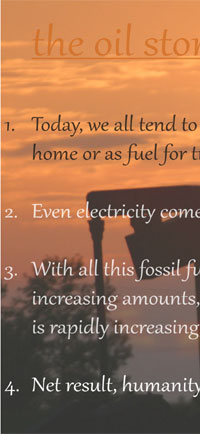 |
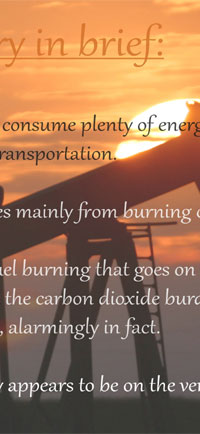 |
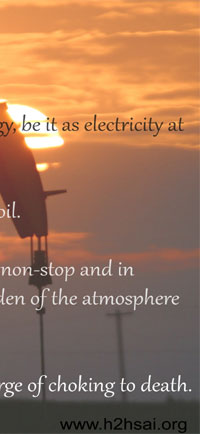 |
Frenzy of Excessive Consumption
The growing demand for luxury goods has fuelled the energy consumption of humanity. We find that individuals want more energy because they want more cars, air conditioners and what not. Moreover, the number of individuals wanting all these is rapidly increasing.
Meanwhile, manufacturers are rushing in to meet the increasing demands for cars, TV sets, etc. To cater to the demand created by the explosive growth in gadgets, more electricity is being produced using coal and oil. Governments the world over have done little to give incentives to promote the development and use of alternate forms of energy because economists say that one should not subsidise energy production but allow market forces to dominate. And what do we find at the end of it all? We supposedly get low-cost electricity but end up paying a lot for healthcare.
Electricity companies are happy about the profits they have made, economists are satisfied that market forces are prevailing but everyone is choking with polluted air. This is the kind of modern maya or illusion we are being sucked into because we do not use our discrimination properly and think things through carefully. In short, we simply do not bother to appreciate that the individual, Society and the environment have a strong interconnection, which if violated, breaks the sacred Golden Triangle!
Greed Decimates the Golden Triangle
Everyone is talking about increase in energy demands and the need to find more energy resources. The more pertinent question we ought to be asking ourselves is whether we really need all that extra energy? Instead, why do we not think in terms of a simpler lifestyle and place a lid on excessive and wasteful consumption?
People do not want to do that; and even if they did want to, profit-making corporations await with multi-million dollar advertising budgets to brainwash them with attractive advertisements, trapping them into limitless consumerism. And this precisely is where Swami’s teachings become hugely important and compellingly relevant.
Promoting an Attention-Deficit Culture
 |
Swami has told us umpteen times about the need for practicing ceiling on desires. What effort do we make to follow that? Take a thing like cell phones. Today, people just do not seem to be able get along without it. It has become an ugly addiction.
Many people may dismiss this observation as being unrealistic, out of step with the times. Notwithstanding the urgencies of modern times, compulsions of business and such, are we aware of the brain damage that cell phones cause?
Never mind the possible damage to the neurons in the brain caused by microwaves, people allow their precious time to be robbed by their overdependence on cell phones.
As a result of this cell phone culture, people do not have enough time for self-development through quality family time, study, observation of Nature, quiet introspection and so on.
This is the more deadly strain of brain damage plaguing our Society at the present time -- the damage caused by not allowing the brain to flower as God intended it; instead, the brain is being washed and dragged along the path of increased consumerism by vested interests. Barring professional needs of doctors and such, others can always remind themselves of the need to live without their cell phones at least at certain times.
Overdependence on cell phones changes one’s mindset. One becomes more of a short-term focus person. Attention span becomes very restricted and when that illness sets in, it becomes difficult to tread the path of spirituality.
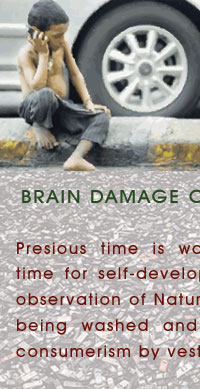 |
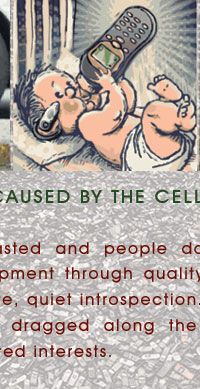 |
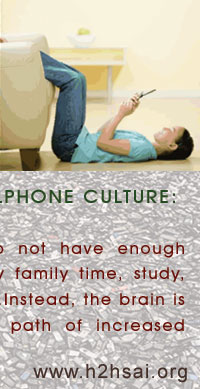 |
The Prasanthi Digital Studio is currently in the process of producing a comprehensive documentary, an epic depicting the story of the Sri Sathya Sai Avatar. Given the vastness of the subject, the project is extensive and will take some time more to complete but occasionally, preview screenings are arranged for select audiences. While most viewers have been moved, many have suggested that the film be shortened.
Doesn’t that make you wonder why people can’t spare an hour for God when they willingly stay awake all night to watch a world cup match? Yet, spending one hour watching a film on Swami seems to be a sort of sacrifice of time. This is the mindset that is a matter of concern and not the cell phone per se. Cell phone culture breeds a culture of short-term priorities and a desire for instant nirvana.
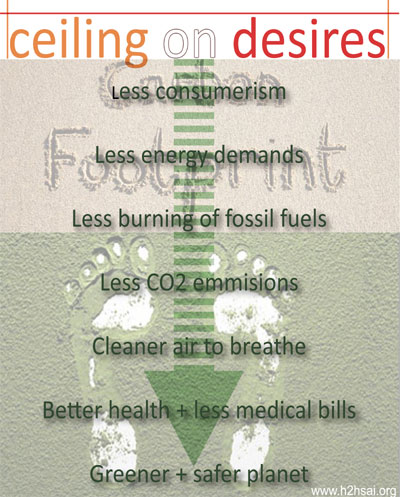 |
Swami keeps reminding us to pose ourselves the question, “Who am I?” How can we contemplate on this profound question if we are jumping from moment to moment to different things? It is no use claiming that this is the way modern life is. That is not really true. What is happening is that we are allowing modern life to envelope us and then to swallow us.
If we really want, we can prevent that by making a serious effort to place a ceiling on desires. The less desires we have, the more time we can make for God. This is an important spiritual truth we HAVE to digest.
Ceiling on desires is the way to responsible and reasonable consumerism. Reduced consumerism would lead to lower energy demands, which in turn would lead to a significant reduction in the burning of fossil fuels. Less burning of fossil fuels would lead to less carbon dioxide in the atmosphere.
Less carbon dioxide in the atmosphere would mean we all would have cleaner air to breathe. More of clean air would mean lesser respiratory problems, better health and fewer medical bills, a healthier Society and so on.
Vested Interests Drive Public Policy
Where does Society come into this picture? These days the word democracy is bandied about a lot, and the government is supposed to be of the people, by the people and for the people. Nice words, but all that is on paper. In reality, given the fact that elections cannot be fought without money, lots of it actually, a nexus soon develops between the so-called elected representatives and those who fund the elections. It’s a known practice and the moneybags that support politicians do so with a clear agenda.
There is beyond man-made laws, an implicit social contract between the individual and Society that involves duties and responsibilities on both sides. This is natural because the individual and Society are just two sides of the same coin. |
Thus, soon after elections, even in so-called democracies, the financiers move in to cash. And they do so by getting the government to lay down policies that favour them rather than the public. In the process, the government often ceases to represent Society; instead, the government works to meet the demands of lobbyists. This has started happening almost everywhere. As a result, there is a strong disconnect between what is really good for the public and what they get.
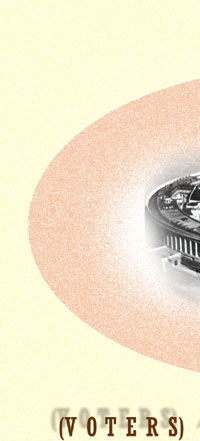 |
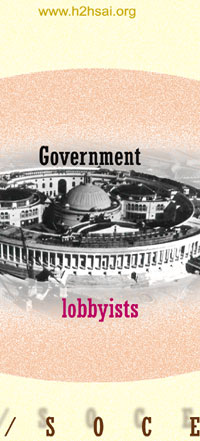 |
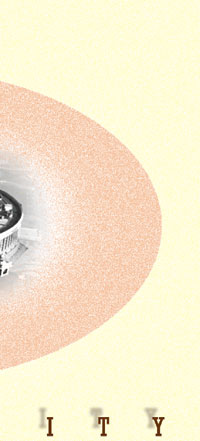 |
Society can exist and prosper only if there is a social contract between the individual and Society, based on a moral foundation. And what is this Society with which one is supposed to have a contract? It is not merely the government but the entire community including non-governmental organisations [NGOs].
For example, the movie industry must give the public only films that promote goodness in the community. If in the name of portraying realism, films show excessive violence and sleazy material, the producer and director are taking Society for a ride. The director may wax eloquent about freedom of expression but he wants the public to pay for his freedom without any return of responsibility. Likewise, the producer wants Society to multiply his wealth, without bothering about the dangerous consequences his films might bear upon the viewers.
Individual and Society Intrinsically Bound
There is beyond man-made laws, an implicit social contract between the individual and Society that involves duties and responsibilities on both sides. This is natural because the individual and Society are just two sides of the same coin. In ancient Indian Society this organic link between the micro and the macro was clearly understood but in recent times, attitudes have changed. To put it differently, there is, whether one likes it or not, a moral law that governs the Universe, Society and individuals; and it is in our own best interest to become aware of this overarching moral law.
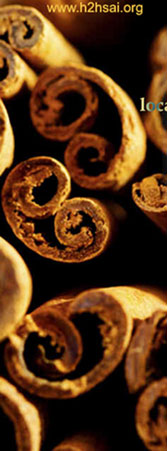 |
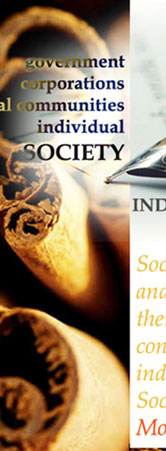 |
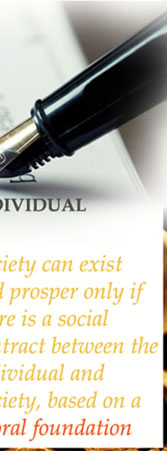 |
In today’s complex and tightly knit world, everyone has a role to play -- the individual, the local communities, the corporations, all the way up to the government. However, there must be a careful and delicate meshing of the roles and responsibilities of the various entities involved. This is possible only if they share common objectives and concerns. The responsibility of the national government is particularly important, as it has to be an impartial moderator as well as a strong regulator so that social balance and equilibrium are not unduly upset.
Interconnectedness of All Life
The factorisation of the Golden Triangle enables man to break up creation into segments that allow him to forget God while dealing with either Society or Nature. Let us also not forget that man is a limb of Society, which is a limb of Nature, which in turn is a part of God. Hence, if man becomes disconnected and fails to see God in Society and Nature, then his acts can actually disturb if not harm Society.
Individuals must be honest because truthfulness and integrity is their true nature. For its part, Society must respond by providing the citizens with all the protection that is their due, especially in the matter of being honest. |
That is not at all desirable because if everyone starts doing that then there would soon be anarchy in Society. In fact, there would not be any perceptible Society, only a loose collection of groups acting against each other, each in its own self interest. Most tragically, we actually see many such examples of failed states, which are at best a collection of tribes dominated by feudal chiefs and warlords.
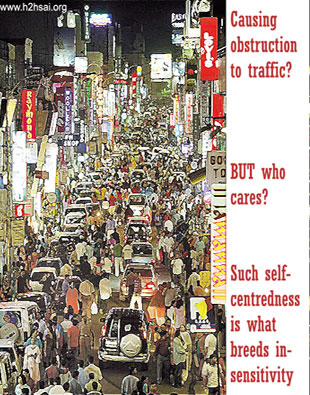 |
It is rather easy to be undisciplined and disrupt order and regularity. It is very common in cities to see two people riding scooters and driving in opposite directions stopping to chat right in the middle of the street, each person on his own scooter. They both would be causing a great obstruction to traffic.
This might seem a small matter but just imagine a person with such a mentality being in a position of importance; he would not bat an eyelid to abuse his power and authority. Such self-centredness is what breeds insensitivity. A disconnect soon develops between the ordinary people and those in positions of power and inevitably, it leads to conflicts of various kinds.
A civilised person would hate to hurt another person. If one saw God in others, it is unlikely the person would create problems for others, including by inconveniencing them. Few realise, both here and elsewhere, that unless the individual and Society are strongly linked with a moral basis, there could be all kinds of problems.
One thing clearly emerges from all this. Individuals must be honest because truthfulness and integrity is their true nature. For its part, Society must respond by providing the citizens with all the protection that is their due, especially in the matter of being honest. Thus, whether we like it or not, the fate of the individual and Society are intimately tied together. If individuals fail to be true to themselves, then widespread fraud and cheating is inevitable and one would end up with a failed Society.
To some, this discussion may appear quite far removed from what might be called conventional spirituality. But then this is practical spirituality and is more important than theoretical spirituality.
Extending this understanding, we must not only be honest, kind, and compassionate to fellow beings but also be very careful to see that our actions do not affect or harm Society as a whole. |
To summarize the discussion on Awareness so far, the highlights are as follows:
- This series is based on the Awareness Course taught to the students of the Sri Sathya Sai University but adapted for a much wider audience and without the rigour that college courses demand.
- Swami defines Awareness as Total Understanding.
- In practical terms, it means seeing God in everything, everywhere, all the time.
- The question arises: Why is this necessary?
- If we are all the time conscious of God’s omnipresence, then we would be very careful in our actions.
- The Golden Triangle is a golden rule of life that must not be violated. If we drop our guard, then we would deal with God in one way and fellow beings and Society at large in another way.
- It would be a major contradiction if we pray to God and cheat fellow beings, as it would then amount to forgetting that God is present in fellow beings.
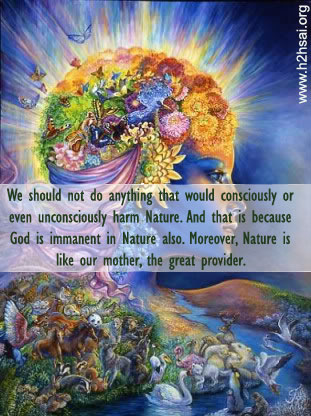
- Extending this understanding, we must not only be honest, kind, and compassionate to fellow beings but also be very careful to see that our actions do not affect or harm Society as a whole.
- Why, you might ask should we bother about Society when we have so many problems ourselves? The answer is that Society is in a sense a reflection of our own self. If we are selfish and ignore Society, then Society too would turn the other way when we desperately want help from it. This is the law of reflection, reaction, resound that Swami often talks about.
- There is another reason also why we should bother about Society, other than the fact we do not want to come to any harm. Society is God. That is the main reason why we should not harm Society and not merely because Society can get back at us.
- Further, we should also be careful about Nature. We should not do anything that would consciously or even unconsciously harm Nature. God is immanent in Nature too. Moreover, Nature is like our mother, the great provider. If we harm Nature when she is giving us so much selflessly, it would be a traitorous act of Himalayan magnitude.
- And to stress all this, Swami often mentions the divine connection running through the individual, Society and Nature, all the way to God.
Practical spirituality has everything to do with not only the individual, but also the relationship of the individual to Society and to Nature. It is to stress this that Swami often tells His students that we are what we are because of Society and we owe a lot to Society, much more than what we think Society owes to us.
You might wonder that all this appears to be very new. The Gita, for example, does not say all this. That impression, though common, is unfortunately wrong. The Gita implies all this but does not dwell on the implications in detail. In small and increasing doses, Swami is beginning to spell out these deeper implications, until now not much commented upon.
You might ask why has all this become important now? What is different now compared to say Vedic times? Why did not the Vedic seers talk about all this? The answer is very simple and Swami has explained this to students many times. In Vedic times, the population of the earth was only about a thousandth of what it is now. Today, about 6.5 billion humans inhabit the same planet, and thanks to technology humans are not only devouring its renewable resources at a devilish pace, but far worse, are polluting the planet almost to the point of destruction because of the unchecked play of evil forces lurking in the senses and the mind.
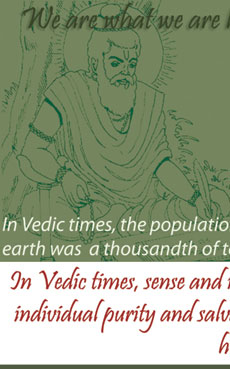 |
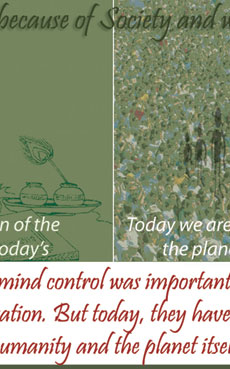 |
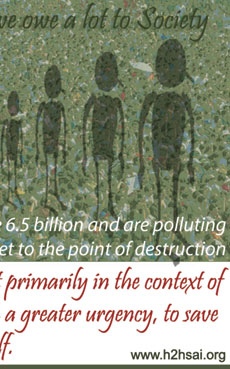 |
In Vedic times, sense and mind control was important primarily in the context of individual purity and salvation. Today, they have a greater urgency, to save humanity and the planet itself.
These implications are not spelt out at all by any Guru; Swami alone is cautioning us day in and day out. And we had better pay serious attention to Him before it becomes too late.
Jai Sai Ram.
Dear Reader, did this article help you in any way? Please share your feelings with us by writing to h2h@radiosai.org mentioning your name and country. Thank you for your time.





